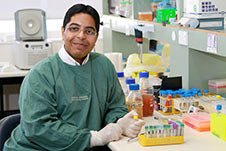
Masters student Abdulmonem Alsaleh
Abdulmonem Alsaleh is hoping to make a real difference to childhood leukaemia with his work in epigenetics.
The Saudi Arabian-born Masters student has almost completed his Master of Medical Laboratory Science degree, working on the “Early Human Blood Cell Development” project.
Abdul came to Otago to do a science degree in physiology, which he completed along with a degree in medical laboratory science.
“In Physiology they would always explain the pathology, so we could understand it and I was fascinated with how the body works.
“I thought Med Lab Science was the way to go and I've been always particularly interested in the haematology side – blood disorders.”
That path led Abdul into leukaemia, and in particular to childhood leukaemia, which has a high cure rate.
“There is a chance for treating leukaemia in childhood and it has become my research interest.”
In his Masters, under the supervision of Professor Ian Morison, Abdul is looking at the epigenetic modifications in normal pre-birth cells. Abdul's hypothesis is that in most children, a specific group of normal lymphocytes present in fetuses would go away after birth. However, in some cases those cells undergo epigenetic modifications and don't regress after birth. They can then develop into cancer.
Research is being taken to understand the pathology and behaviour of these cells which may lead to a better understanding of childhood leukaemia, Abdul says.
A similar process is well known in vascular birthmarks (strawberry nevi), which are “leftover” embryonic cells. These can be treated by a simple drug such as a beta blocker.
Could it be possible one day to identify and treat the cells which lead to leukaemia in the same way?
Abdul is planning on remaining at Otago and continuing his research in this area while undertaking a PhD, beginning later this year.
“I am very happy here at Otago. The main thing that makes me stay is the friendly staff. They are always patient and taking from their own time to explain things to me that I don't understand. In particular, I owe a debt of gratitude to Professor Morison for his continuing support and help. Also, I would like to acknowledge the huge support from Professor Morison's research team, especially Dr Robert Weeks, Dr Gwenn Le Mee, and Dr Jackie Ludgate.”
A short trip home to Saudi Arabia to see family is next on the list, then straight into more research.
“I'm looking forward to it.”
Find out more about Medical Laboratory Science at Otago.
An e-newsletter for people interested or involved in postgraduate study at the University of Otago
Archive
Subscribe
The Otago Post is distributed via email three times a year.
Subscribe to the Otago Post.
